
by AmyPlano | Aug 25, 2016 | PCOS and College, PCOS and Weight Gain
PCOS and College
Do you have PCOS and are heading off to college? Is your head about ready to explode with all the information available on the web regarding nutrition, diet and PCOS? If so, you have come to right spot!
Holy cow, I cannot believe it is that time of year again. Can you? As a seasoned college professor you would think I would be used to this time by now. But every year the end of summer sneaks up on me. Insert sad face emoji. If you have PCOS and are heading off to college you may be experiencing a bit of anxiety regarding how to stick to your diet. Staying on track in college with your diet can be challenging – but certainly not impossible if you have PCOS.
College can be an exciting time! It is the first time you are on your own flexing those “independence muscles.” However, it can also be a very stressful time, full of uncertainty. And as if having PCOS was not bad enough – now you need to navigate an entirely different food domain. But fret not my friend – you are in luck. We have my Yale Dietetic Intern Jacquelyn Budlowski here, to give you some pointers on how to keep on track with your diet and exercise.
PCOS and College: Ten nutrition tips for staying on track with your diet
Write it down to stay on track with your diet

Start a food journal or use an app to track your intake and make sure you stay within your recommended calorie and carbohydrate alotment. Think of it as one of your daily homework assignments! We LOVE the myfitnesspal app as it super user friendly and allows you to track not only your calories – but also your carbohydrate, fat and protein intake. Studies show people who write down what they eat are more successfully at losing weight and keeping it off.
Get your little butt moving
Most college campuses have free gym memberships included with tuition. Many also offer group exercise classes. This can be a fun way to work out and beat the ho-hum of the treadmill. Some colleges even offer recreational sports as a fitness option. This can be a fun way to meet new people, fit in your exercise in and even try a new sport you may have been dying to try. Aim to exercise for at least 120 minutes per week.
Limit your alcohol intake
If you drink alcohol, keep in mind it supplies calories (and often carbs) but no nutritional value. A light beer, a glass of wine, or an ounce of liquor each has about 100 – 140 calories each. The carbohydrate content depends on what the alcohol is mixed with. Plus when your body is metabolizing alcohol – fat breakdown comes to a screeching halt. This can prompt weight gain and reduce your overall metabolism. Plus, alcohol increases your appetite and decreases your mindfulness leading to poor food choices. Did I just hear someone say “Let’s order Chinese ?!?”
Be mindful of “seconds”
It can be tempting to go up for a second plate knowing you have unlimited access to food with your dining card. However, ask yourself if you are really hungry before going up for a second helping. It is possible that you are just overwhelmed by the abundance of food and not really hungry. A good habit is to walk around the cafeteria and check out all the options before deciding what to eat. That way you can make the best balanced choice while getting what you really want in the first place.
Stock up on healthy PCOS friendly snacks
Keep healthy snacks in your dorm room. This way if you are up late studying, you will not be tempted to grab something from the campus store such as candy, chips, or ice cream. Good snack options include cheese sticks, low sugar Greek yogurt, hummus/veggies and even something like a Quest Bar in the event you cannot a balanced meal in.
Don’t Abandon Your Summer Goals
Continue to choose nutrient dense, high fiber options when consuming carbohydrates. Focus your meals mainly around high protein foods and healthy fats such as olive oil, nuts, seeds and avocados (if they have them!) Cafeteria salad bars are a great way to bump up your fiber and pack in your protein. Choose plenty of green leafy veggies and lean sources of protein at the salad bar such as chicken, tuna, chick-peas, hard-boiled eggs and cottage cheese. Your cafeteria may even have a grill station where you could pick up a turkey burger and throw that on top of a salad – yum!

Speak Up Cysta!
Most campus contract food service companies have a list of nutrition values for most of the foods they provide. Ask for the nutrition information or see if you can find it on their website. That way you do not have to guess, “Is this a good choice?” Then, you will be armed with knowledge to select the most PCOS friendly options available to you. No excuses girl friend!
Get your Zzzzz’s
Not getting enough sleep can put a serious damper on weight loss efforts. Sleep deprivation can affect the hormones that control your hunger as well as increase an individual’s level of insulin resistance. This makes it much harder to lose weight. Also we often don’t always make such great food choices when we are hangry, right? Therefore, try your best to get at least 8 hours of sleep per night.
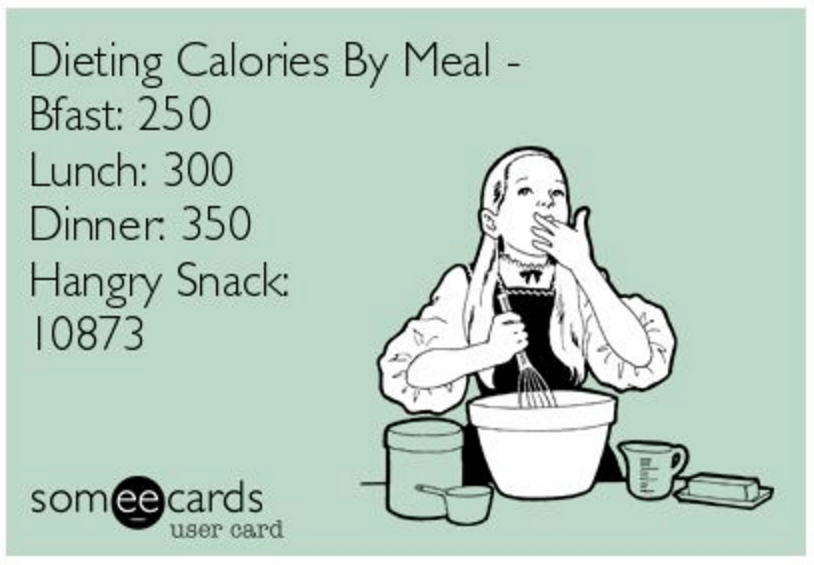
Find your inner Yogi
Balancing classes, exams, friends and extracurricular activities can be overwhelming! It is no surprise that stress can hinder your weight loss goals. Find different ways to relieve stress aside from eating. Many college campuses offer free yoga and/or meditation classes. Even if your school does not offer this opportunity you can find numerous free resources such as podcasts and youtube videos online to help decrease stress. It is amazing what you can get for free when you look!

Don’t be afraid to ask for help
Most schools have health centers that have wellness and nutritional trained professionals who are there you help you make the right choices when it comes to eating and exercise. Don’t be afraid to make an appointment and bring them your schedule. Be honest with them. Let them know you have PCOS and that you are struggling with your eating. They should be able to help you lay out a personalized plan of action to keep you on track. Always remember – you are so much stronger than you think!
So, I know we must have missed a couple hints for you college cysters 🙂 But we would LOVE LOVE LOVE to hear your tips for staying on track when you have PCOS and are at college. What are some things that you have tried that have worked? Any epic fails? Please share with us in the comments below.


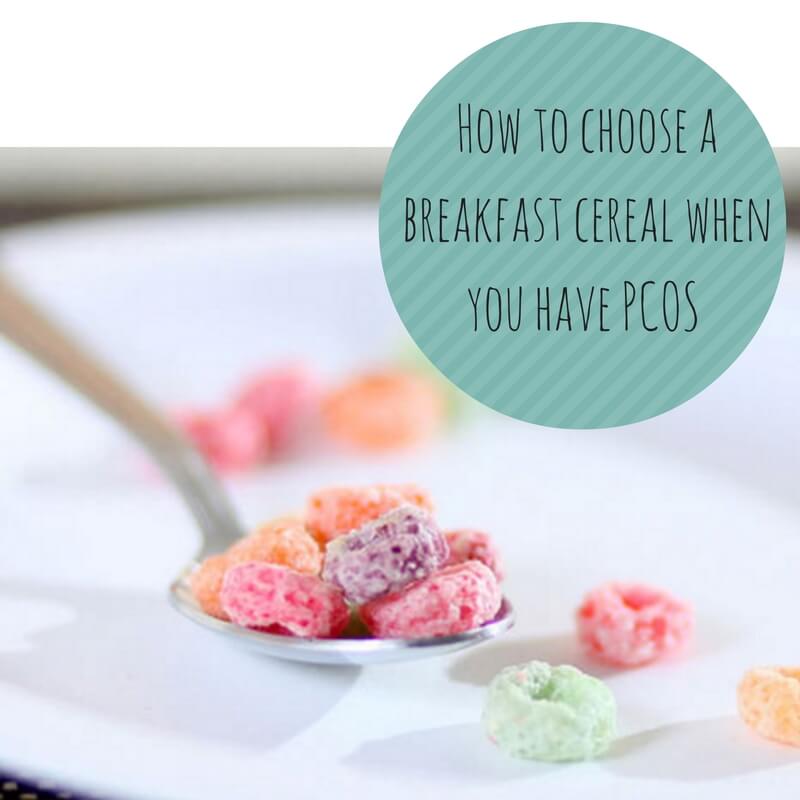
by AmyPlano | Aug 21, 2016 | PCOS Breakfast Foods
PCOS friendly cereals – Do they even exist?
So as a Powerful Chick with Outrageous Spirit I know what you are thinking.

PCOS friendly cereals do in fat exist. However, while I am certainly not advocating cereals along the like of Lucky Charms and Golden Grahams every day (although those do happen to be some of my favorites!) I do think there can be a place in the diet of the PCOSers for cereal. It is just as important to know which cereals to choose. Time to put our label reading glasses on and get to work.
Don’t Be Fooled
Information on the front of the box can be misleading. A lot of PCOSers look for products that state “low in sugar,” in an effort to watch their carbohydrates. Unfortunately, a cereal claiming to be “low in sugar” might not be as equally as awesome in terms of fat, whole grains, or sodium. Therefore, it important to read both the nutrition information panel as well as the ingredients to make the most educated decisions when it comes to PCOS friendly cereals.
Wholly grains
I say it a lot, and I’ll continue to do so: Whole grains and foods that contain whole grains provide a heck of a lot health benefits (especially for women with PCOS!). Whole grains contain all three parts of the grain along with fiber and many other nutrients such as B vitamins, vitamin E and magnesium.
Check the ingredient list on the cereal box. The first item listed should be a whole grain. Examples include but are not limited to whole wheat, whole-grain corn, barley, oats, oatmeal, millet, quinoa and wheat berries.
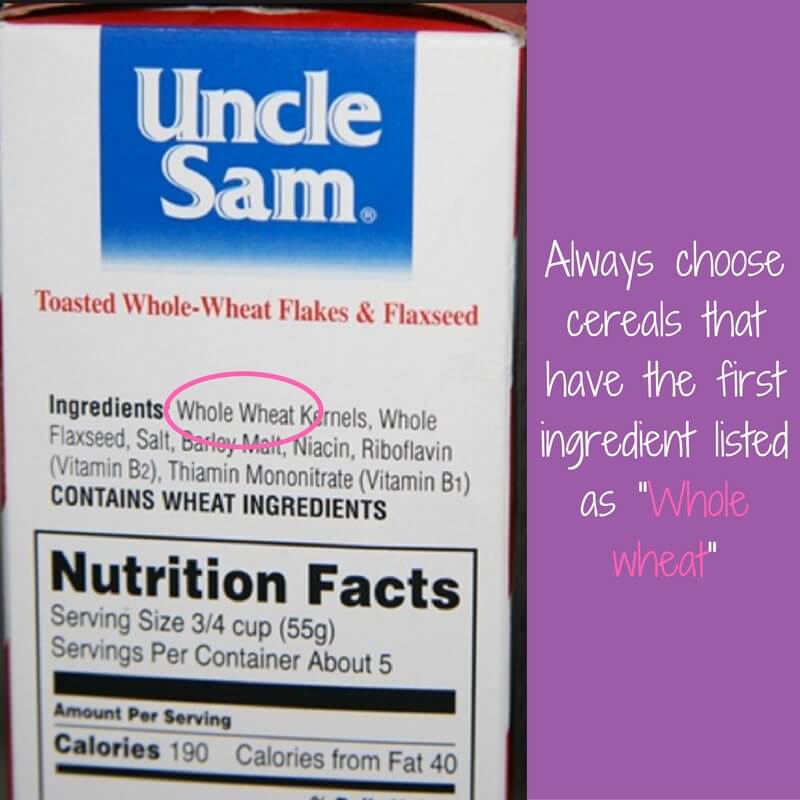
The words “multigrain,” “wheat,” “wheat germ,” and “bran” are not necessarily indicators of a whole grain. These terms may simply mean part of the grain is missing. Or in some cases the ingredient multigrain may imply many grains none of which are whole. Sneaky!
Fill up on Fiber
The health benefits of fiber and PCOS are endless. Research supports that diets that are high in fiber help lower blood sugar, assist with weight loss, lower cholesterol and help us poop. For women with PCOS, I would love for you get at least 30 grams of fiber per day. In an effort to meet these goals try to aim for cereal with at least 3 grams of fiber per serving.
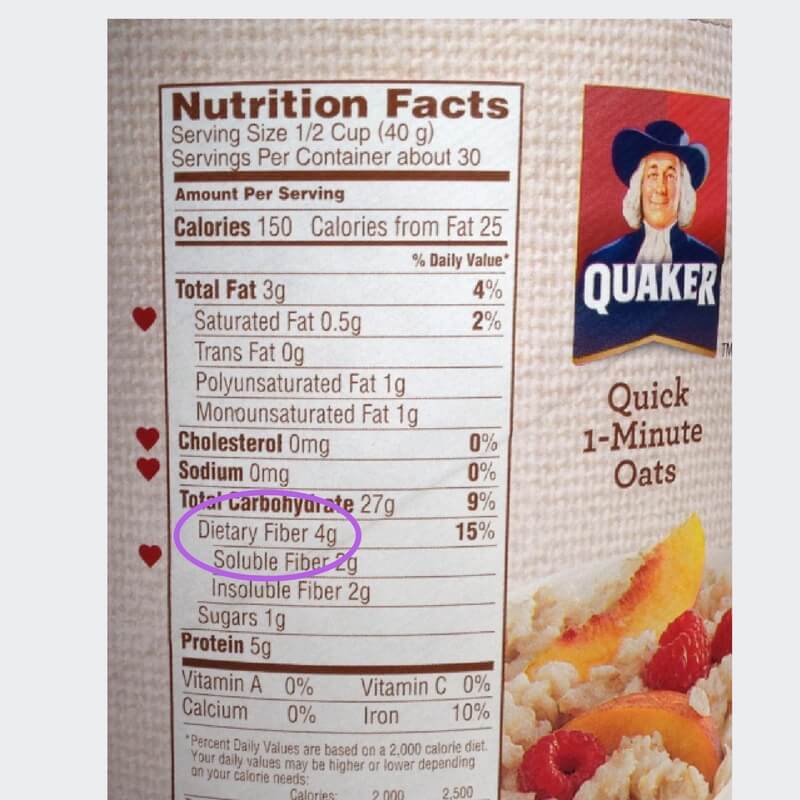
As you can see here, quick 1-minute oats have a whopping 4 grams of fiber. This is an excellent example of a high fiber cereal.
Limit the unhealthy fats
Saturated and trans fats are the bad guys. Fortunately for us, most PCOS friendly cereals are low in saturated fat and most have no trans fat. But if you’re a granola groupie, look out, as many granolas may contain saturated fat and contain more total fat than a bowl of French fries! And you thought all granolas were healthy…sadly not.
Look for cereals with zero grams of saturated fat and choose those with fewer than 4 grams total fat per serving.
Steer clear of high-sugar cereals they are of no benefit for women with PCOS
As a PCOSer sugar is the first thing that often comes to mind when you hear the word cereal. Given the high sugar content of many cereals you are often better off eating a bowl of crumbled up cookies and milk for breakfast. A good rule of thumb is to stick with cereals that have no more than 8–10 grams of sugar per serving. That’s roughly two teaspoons of sugar. Less is even better!

Note – In effort to optimize blood glucose control, remember to also look at the total carbohydrate grams (after checking out the serving size, of course), not just the grams of sugar. Try to aim for less than 35 grams of total carbohydrates per serving. But as a matter of principle, it pays to check out the grams of sugar on cereal labels.
Women with PCOS should seek out cereals that contain a modest amount of protein
Protein, as well as fat, plays a key role in extinguishing hunger. Ingesting protein provides staying power, so it may help you control the munchies. Look for PCOS friendly cereals with 3 or more grams of protein per serving. You’ll also get protein from the milk you add to your cereal. By adding 1 cup of 1 % milk to your cereal you are adding 8 grams of protein to your meal. For even more protein stir your cereal into some plain greek yogurt for an extra 12-18 grams of protein. Boom!
Shy away from sodium
Cereal is probably not the first food to come to mind when you think about high sodium foods. But surprisingly, some cereals contain some hidden sources. For example, one half-cup of Post Grape-Nuts contains 290 milligrams of sodium. General Mills Wheat Chex contains 270 milligrams per 3/4 cup serving. Stick with PCOS friendly cereals that contain less than 200 milligrams per serving.
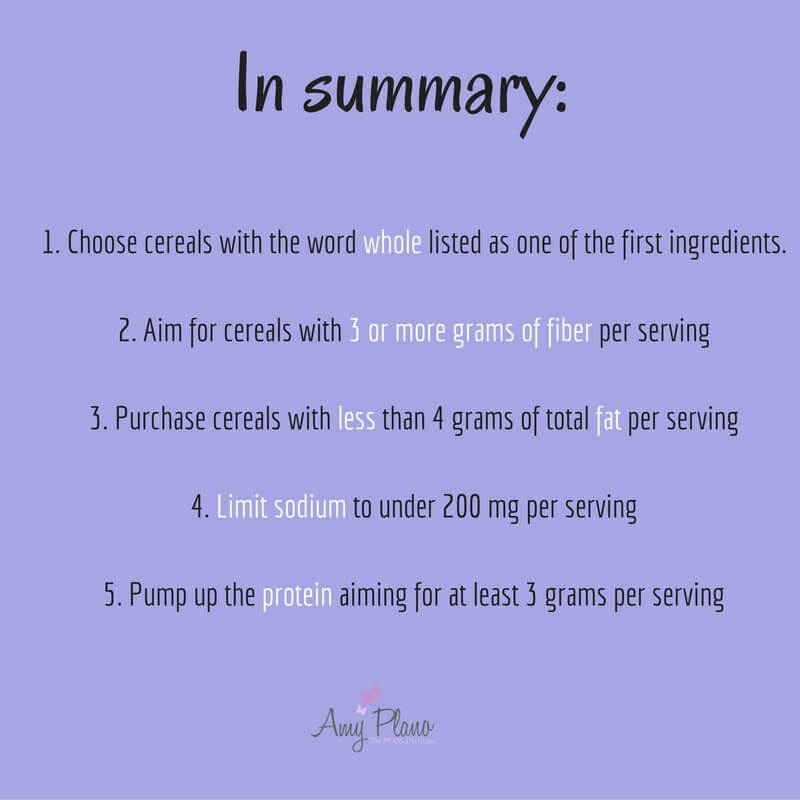
There is no denying it that you PCOSers love your cereal ♥ But by following the above guidelines you can steer away from cereals that damper your metabolism and choose those with some nutritional merit. As a rule of thumb I would recommend that women with PCOS consume cereal no more 1-2 times per week. While it certainly does have some nutritional value, there are other more quality breakfast foods I would love you to choose.


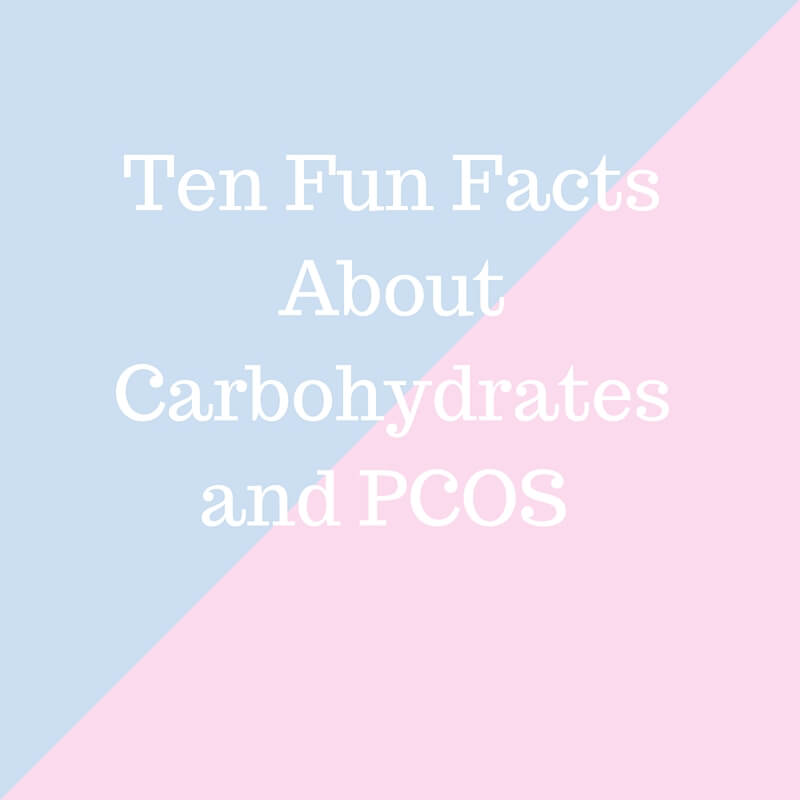
by AmyPlano | Aug 16, 2016 | PCOS and carbohydrates
PCOS and carbs – Ten Facts You NEED to Know
1. If you have PCOS you should aim to consume only a moderate amount (35 % or lower) of carbohydrates to decrease the consequences of insulin resistance and promote weight loss.
2. Carbohydrates come in all shapes and sizes. Bread, rice, quinoa, apples, watermelon, yogurt, ketchup and donuts while are all very types of different foods all contain carbohydrates. However, just because a food is considered a healthy carb does not mean you consume with reckless abandonment!
Think twice about ordering the low-fat blueberry muffin from Dunkin!
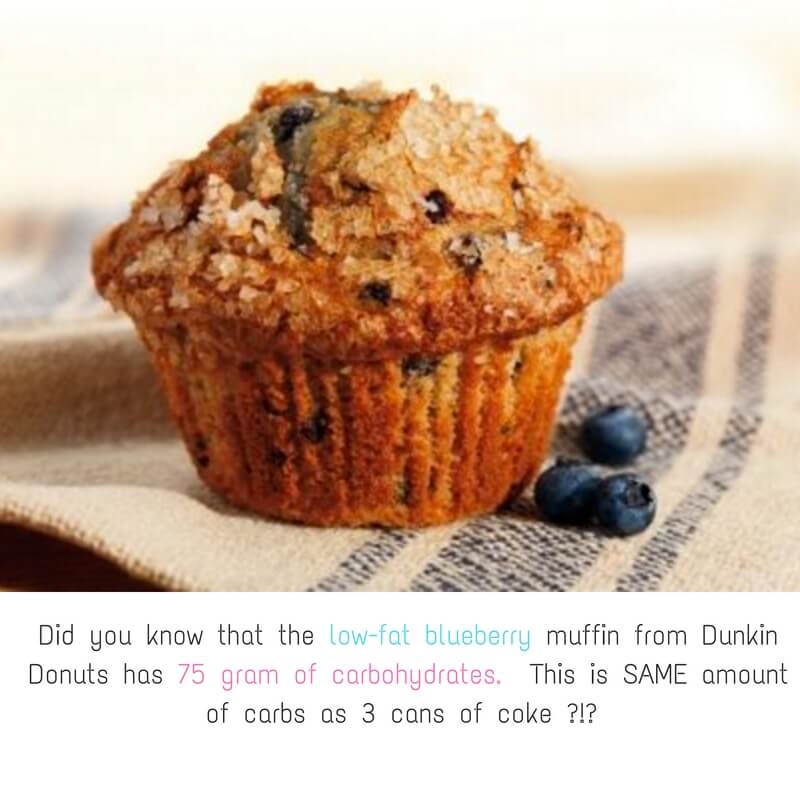
3. All vegetables contain carbohydrates. One half cup of most non-starchy vegetables contain about 5 grams of carbohydrates. But don’t worry silly! Because the carbohydrates coming from non-starchy vegetables contain significant fiber – no need to count. So go ahead and chow down!
4. One cup of cooked brown rice has 45 grams of carbohydrates and one cup of cooked white rice has the same amount of carbohydrates. The only difference between the two types of rice is that brown rice has 2.0 grams more fiber PER CUP than the white rice.
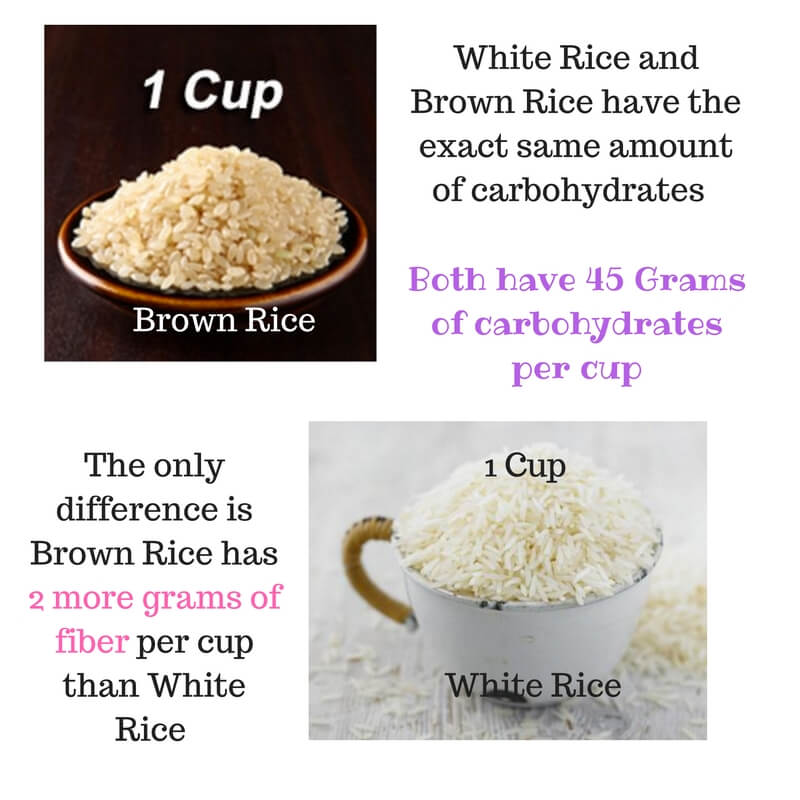
5. Gin, vodka, rum and tequila all contain zero grams of carbohydrates. The mixers are where all the carbohydrates come from in most cocktails.
6. Women who have PCOS and suffer from insulin resistance are more likely to have cravings for carbohydrates than women who have PCOS and are not insulin resistant.
7. When selecting a bread check the label for one that has the words “whole wheat” as the very first ingredient and contains at least 3 grams of fiber per slice. Looking for a PCOS friendly bread – how about trying Dave’s Killer Bread?
Dave’s Killer Bread – Give it a go!

8. The less body fat an individual carries the more sensitive they are to the effects of insulin. This mean the more carbohydrates they can consume without increasing their body stores of fat.
9. A Reduced-Fat Blueberry Muffin from Dunkin’ Donuts contains 75 grams of carbohydrates which is close to many women who have PCOS total amount of carbohydrates for the whole day.

10. Carbohydrates are not “bad” for women with PCOS. We just need to make they know the appropriate amount for their own bodies.
How do you manage to include indulgences in your diet while still watching your carbs? Tell us in the comments below. Our community is always psyched with insider insight 🙂



by AmyPlano | Aug 8, 2016 | PCOS and Motivation
How to be Happy – Slap PCOS in the face with gratitude
If you learn any one thing from me on your journey to wherever you may need a little help going 🙂 — I hope you remember to do this one simple thing – practice being gratitude every. single. day. From over a decade of experience working with women with PCOS – I have often seen more frustration and sadness than happiness most day.
But please remember no matter how bad it may seem — there is always something to be grateful for. There is always something to smile about. Please do not let a single day go by without counting your blessings and appreciating all the wonderful things in your life. By fostering an attitude of gratitude you will stay grounded to the good and find that you have no time left for the bad.
People spend so much time complaining about the things they don’t have focusing on the things that they want or feel like they should have. This leaves almost is no time left to appreciate what they already have.
Why gratitude is SOOOO important, especially for women with PCOS
A while back I read a fantastic article in the magazine Inc. In this well-written article, Elliot James talks about the power of gratitude. He compares gratitude to the likes of an emotional muscle that one can and should flex everyday. He makes a very profound statement that I could not agree with more:

Spot on! People who are grateful not only seek out more successes but they draw more successes into their lives.
Just think about it for a moment. When you are grateful, the more others enjoy being around you. It’s kind of like when you sparkle, like you all do – everyone wants to be your friend. Your appreciation supports those around you and let’s them know they are accepted. By expressing your gratitude you allow these folks to see the positive elements inherent in daily life. This prompts them to feel more hopeful about the possibility of future success.
In my world clients (and potential clients) love to feel that you are grateful for their business. This creates strong bonds of loyalty and mutual support. One of the ways I let my clients is know I am appreciative is when they send me a referral. Each client who is gracious enough to refer someone to me receives either Trader Joes or Whole Foods. This is not something that is noted anywhere in my literature. However, it is something I feel EXTREMELY strongly about. Word of mouth referral are truly what keeps me doing what I am doing!
By expressing my gratitude it doesn’t only acknowledge the person’s action. It recognizes the actual person. In doing so, I set a winning tone and one in that is mutually inclusive for everyone involved.
Another example of gratitude is something I experienced when I worked at the Nutrition Clinic at Yale. We all know employees are more committed and productive when they know that you are thankful to have them on your team. I can tell you for a fact, this was one of the best things about working in the Nutrition Clinic. It truly felt valuable and that my services were not only appreciated by the patients, but also by the management. And I can honestly say that had that not been the case if I hadn’t stayed around as long as I did. It really made all the difference for me and is something I will never forget.
Just like learning to not take everything personally takes some time to master; so does learning the art of gratitude. However, the more you flex and use that emotional muscle; the more it will strengthen and grow. And after all, who does not want big guns?
Health and happiness: How I practice gratitude
One of the things I find extremely helpful in my own life is to set aside two separate times a day to practice gratitude. When I worked at Yale, this was easy! For the whole ride in rather than listening to the radio, I would go through a whole list of things in my mind I was grateful for. Now that I do not spend that much time in my car, I instead have a little notebook called my “Gratitude journal.” Each morning I write down 10 things I am grateful and appreciative for. I then revisit this list right before I go to bed. This practice starts and ends my day on a positive note. It really makes me recognize just how amazing and blessed I really am. It also keeps me from taking things for granted which is sometimes so easy to do.
As you start to practice gratitude (and I really, really, really hope you will!) you will notice, over time, a real change in the whole trajectory of your life. You may find that your efforts to create the career and life you want are increasingly successful. You’ll begin to have a practical experience of the positive impact of approaching your life with a focus on gratitude. Which will give you even more to be grateful about.
And one of the most marvelous things about gratitude – it has no upper limit. You can be as grateful as you want to be. Develop an attitude of gratitude and you will have more things to be grateful about tomorrow! And what’s a better time to start than today?
I would love to know despite all you have been through with this diagnosis of PCOS what you are grateful for ?!? I know you can think of something. Give me the 411 on your gratefulness.



by AmyPlano | Aug 6, 2016 | PCOS and carbohydrates, PCOS snacks
Finding PCOS friendly snacks can be challenging, right? Especially mid summer when all your friends and family are hitting up the Sundae Hut! And If you are anything like me – then you LOVE a sweet treat in the summer! But if you have PCOS and are watching your carbohydrates then you know the pickings are slim in terms of tasty treats. But fear no more – I recently stumbled upon two tasty treats that are right up your alley. Not only are they low in carbohydrates – but they taste pretty AWESOME, too!
My two new summer obsessions are: No-Sugar Added Outshine Frozen Fruit Bars & Halo Top Light Ice Cream
Outshine Bars
No Sugar Added Outshine Bars are frozen fruit bars that come in a variety of flavors. Right now in my local Shop Rite they have two variety packs; one pack has Black Cherry, Kiwi & Mixed Berries while the other pack has the flavors Strawberry, Raspberry & Tangerine. I just bought the pack below. At Shop Rite in CT they are on sale this week with each box of 12 pops selling for $2.77. That is a score because I have seen these lovelies for as high as $5.99 per box! So scoop them up until Sunday when the sale ends.
Outshine has several products. Make sure to get the bars that specifically state “No Sugar Added. ” The regular Outshine Fruit Bars have about 15 more calories and 5 more grams of carbohydrates than the no sugar added variety. Not that this makes a huge difference but I just wanted you to be aware so you don’t get overwhelmed when you go hunting these PCOS friendly snacks down!
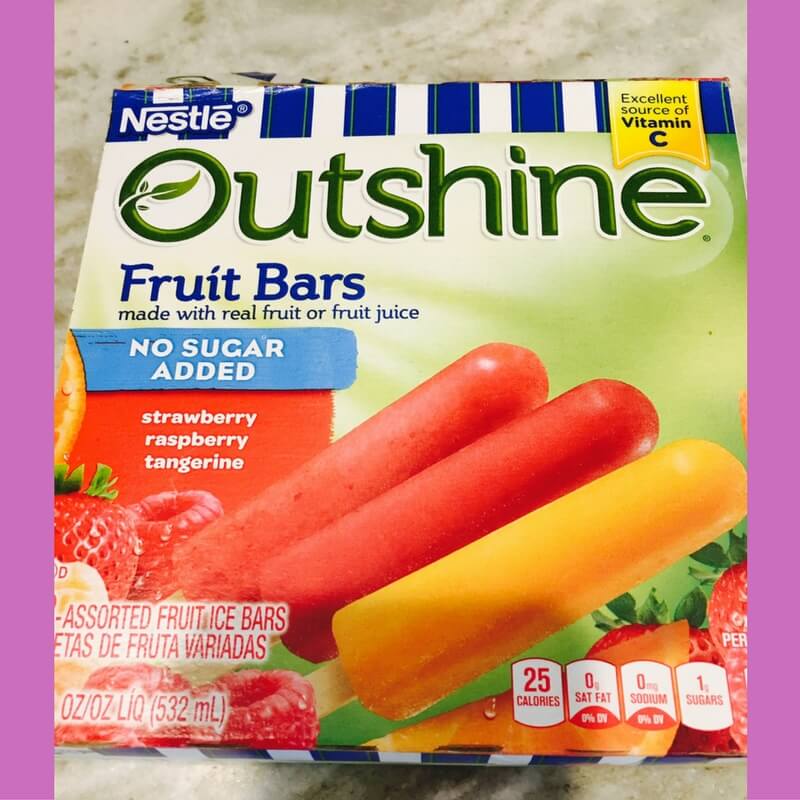
How do I count the many ways I love No-Sugar Added Outshine Bars ?!? The reasons are endless but below are just a few
Made with real fruit
Excellent source of Vitamin C
No high fructose corn syrup
25 to 30 calories
No sugar added
Only 6 – 7 grams of carbohydrates per bar
No artificial colors or flavors
While most low-sugar/no-sugar frozen fruit bars are somewhat tasteless – Outshine Bars taste super juicy! I am not sure how they pack so much flavor for only 25 calories! It is crazy. If you are looking for a low calorie, low sugar and low carbohydrate frozen treat that is PCOS friendly – then Outshine Bars are the answer.
Halo Top Light Ice Cream
Another of the PCOS friendly snacks I am LOVING this summer is Halo Top Light Ice Cream. While I have only tried the Vanilla Bean flavor I have to say I was very impressed.
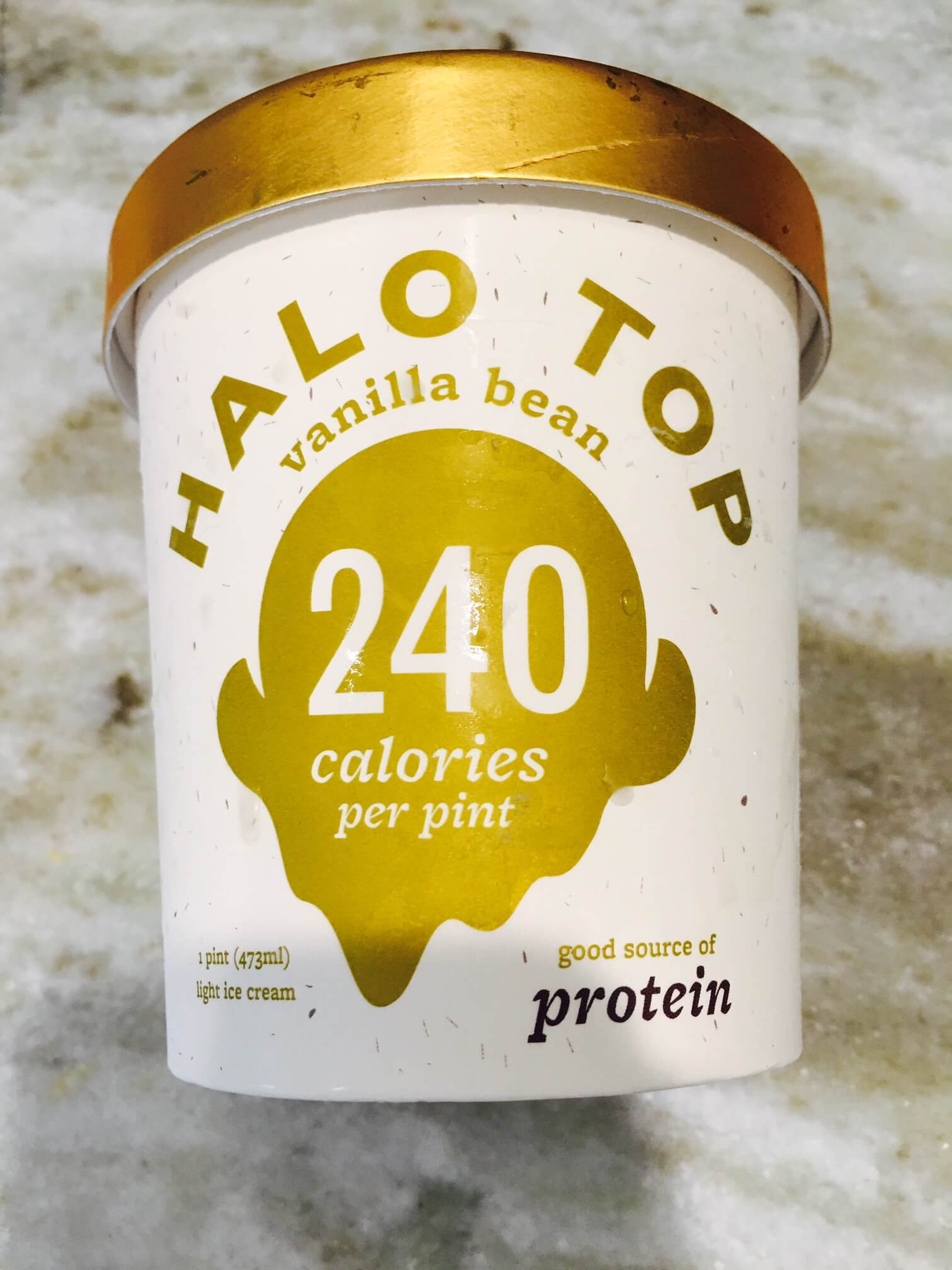
Halo Top Light Ice Cream claims, ” Finally healthy ice cream, that really tastes like ice cream.” And I have to agree! The consistency was smooth and you could really taste the distinct taste of the vanilla bean. It was not watery like Arctic Zero or Wink – two other low calorie frozen desserts that masquerade as ice cream. Halo Top comes in a range of flavors. Here is a list of all their awesome flavors — including ones “Birthday Cake” and “Chocolate Mocha Chip.” Yum!
Nutrition wise the profile is pretty hard to beat! Halo Ice Cream comes in pint sized containers (just Ben and Jerrys!) and seems to be located with the speciality ice creams and gelato in the grocery store. For the pint at Shop Rite I paid $3.65 and it was on sale. Regular price for the pint was around $4.99 – which for 4 servings is pretty pricey! I have seen it in most grocery stores including Whole Foods. With only 60 calories per 1/2 cup (that’s a serving!) that is about one third of the amount of calories as regular ice cream.
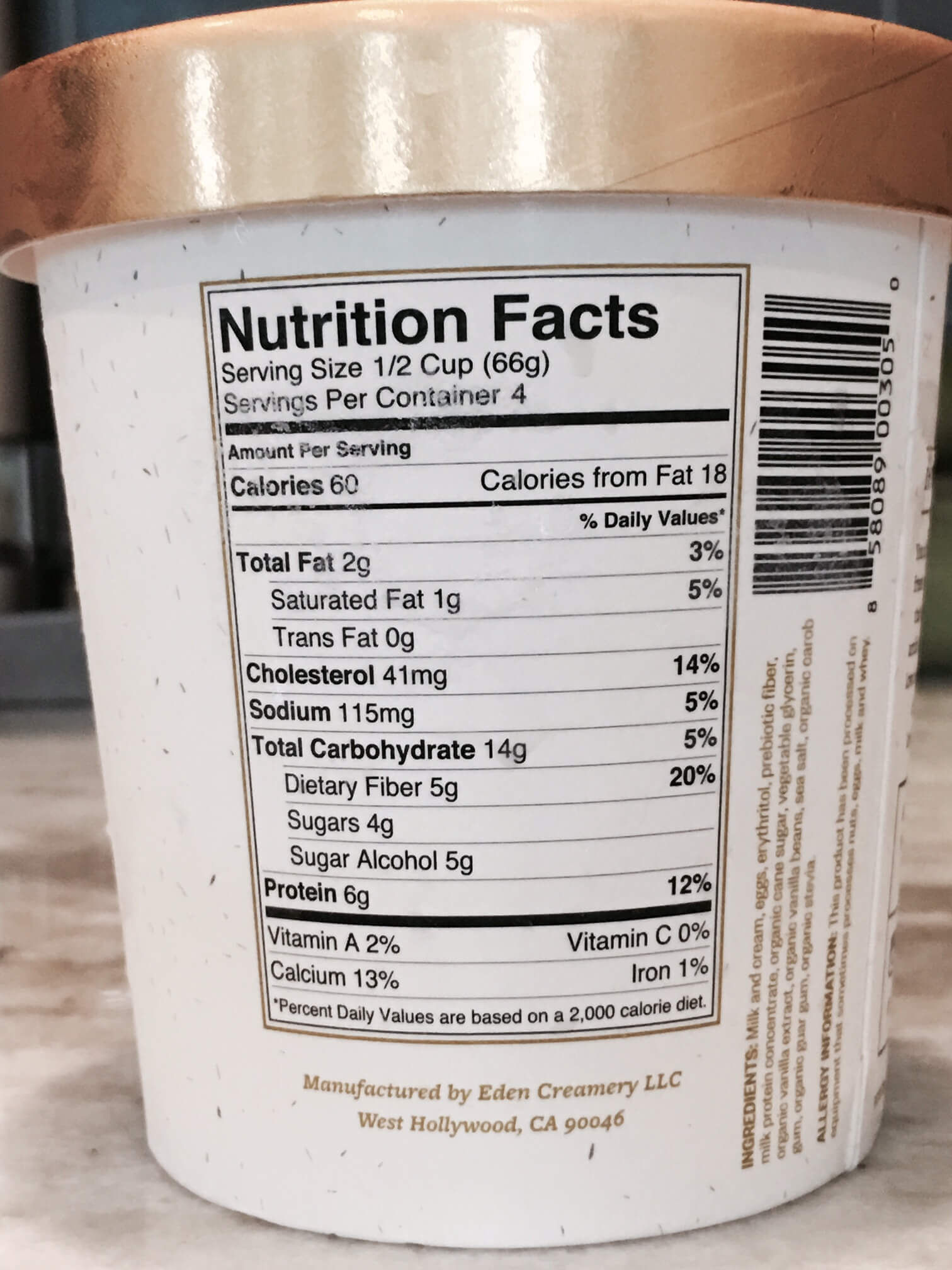
Below is a breakdown of Halo per pint and per 1/2 cup serving:
- Protein: 24 grams/6 grams
- Fat: 8 grams/2 grams
- Total Carbs: 56 grams/14 grams
- Fiber: 20 grams/5 grams
As you can see Halo Top fits the profile of our PCOS friendly snacks. It is low in carbohydrates (14 grams / serving), high in fiber (5 grams / serving) and it even contains a modest amount of protein (6 grams / serving). Most regular ice creams on the market are high in fat, while Halo only provide 2 grams per serving!
So Amy how do you classify PCOS friendly snacks? Great question my friend. My guidelines for snacks for women with PCOS is that each snack is around 100 – 150 calories and at or under 15 grams of carbohydrates. Halo Top ice cream fits the bill rather nicely. And … most importantly … it tastes pretty dang good!
So next time you are in the mood for something cold, low in carbohydrates and tasty — get your little butt to the store and pick No Sugar Added Outshine Bars and a pint of Halo Top ice cream and you are good to go! You can thank me later ♥ ♥ ♥
I would LOVE to hear whether you are digging or not digging these treats. What did you love most about them most? Let us know in the comments below. XoXo




























